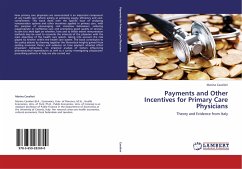How primary care physicians are remunerated is an important component of any health care reform aiming at achieving equity, efficiency and cost-containment. This book deals with the specific issue of analyzing remuneration systems and other incentives applied in primary care, with the purpose of encouraging cost conscious behaviours, reducing inappropriate or ineffective care and promoting good quality of services. Its aim is to shed light on whether, how and to which extent remuneration methods may be used to reconcile the interests of the physician with the main objectives of the health care system, taking into account the role played by him/her within the health care system. The book contributes to the policy debate by drawing together the theoretical insights gained from existing economic theory and evidence on how payment schemes affect physicians behaviours. An empirical analysis of factors influencing pharmaceutical expenditures as well as a survey investigating physiacians prescribing patterns in Italy are also carried out.
Bitte wählen Sie Ihr Anliegen aus.
Rechnungen
Retourenschein anfordern
Bestellstatus
Storno








